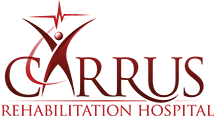
Experiencing a stroke can be scary, and often, patients are left wondering where to begin in their recovery process. After your loved one experiences a stroke, it’s important to make sure they’re on track to recovery. Stroke rehabilitation is often multi-faceted, requiring multiple types of rehabilitation to help patients return to living their normal lives.
Let’s discuss the different types of therapy our expert team of physicians recommends in helping patients recover from their stroke.
Physical Therapy
Oftentimes after a stroke, a patient is left with weakened muscle strength and coordination. To help regain strength and mobility, doctors often recommend physical therapy. Each physical therapy session is tailored to the patient, ensuring they get more comfortable standing, sitting, and walking for long periods of time. Depending on the post-stroke symptoms, the provider may recommend 30-60-minute physical therapy sessions multiple times a week.
Occupational Therapy
Following a stroke, it’s hard for many patients to get back to living through their daily routines. That’s where occupational therapy comes into play. While physical therapy focuses more on helping patients regain their strength to walk and be mobile, occupational therapy puts a strong focus on helping patients return to completing daily tasks like cooking, cleaning, self-grooming, and more. Physical therapy and occupational therapy work hand-in-hand to provide patients with a balanced recovery, ensuring they have the strength to return to their pre-stroke condition.
Speech and Swallow Therapy
It’s not uncommon to see post-stroke patients have trouble with their speech and swallowing. Speech and swallow therapy help patients regain the use of the muscles in their face, mouth, throat, and tongue, so they can get back to communicating and eating comfortably. Speech therapy sessions often involve understanding words in addition to pronouncing words patients use every day to communicate with others. This may involve the use of flashcards and frequent repetition.
Diet & Nutritional Counseling
The way you eat has a great impact on the way your body functions – the same goes for patients after they’ve had a stroke. Your diet and nutrition counselors may work with your swallow therapist to ensure you eat balanced and nutritious meals while your variety of foods may be limited. Research shows that a healthy diet low in sodium and fat is beneficial for patients following a stroke. Your nutrition counselor will work with you to ensure you are able to maintain this type of diet while taking into consideration the foods you enjoy eating and your current lifestyle.
Psychological Evaluation & Treatment
Your mental and emotional well-being are just as important as your physical health. Many providers urge their patients to see a psychologist or psychiatrist after experiencing a stroke to ensure they are in a healthy mental state. In the event you are suffering from anxiety, depression, or another mood disorder following your stroke, your mental health professional can ensure you get the treatment you need, whether that’s with therapy sessions, medication, or a combination of the two. We encourage all our patients to see mental health professionals after a traumatic medical event to ensure they stay in a healthy state of mind.
Stroke Rehabilitation in Sherman, TX
If you’re looking for a stroke recovery program near you, look no further than Carrus Rehabilitation Hospital. We are proud to provide inpatient services to men and women in Sherman and the neighboring communities in Texas. In addition to the therapies above, our facility hosts a wide range of amenities, including walking trails and a rehabilitation gym.
To learn more about how you or your loved one can benefit from our stroke rehabilitation programs, we encourage you to call us today at (903) 870-2600. One of our compassionate team members will be happy to assist you over the phone.

